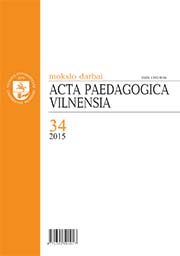Mokytojų požiūris į integruotą sveikatos ugdymą ir vaidmuo jį įgyvendinant
Teachers’ views on integrated health education and the role of teachers in applying integrated education in pedagogical practice
Author(s): Vida Gudžinskienė, Jūratė ČesnavičienėSubject(s): Law, Constitution, Jurisprudence, School education, Methodology and research technology, Social development, Health and medicine and law, Sociology of Culture, Sociology of Education
Published by: Vilniaus Universiteto Leidykla
Keywords: integrated health education; teachers’ views; role; school;
Summary/Abstract: The purpose of integrated health education is to ensure a successful child health education in school, to contribute to the child’s physical, mental and social well-being, capacity development. Integrated health education is based on the mobilized work of school community: cooperation among different subjects’ teachers and other specialists, the integrated efforts of school, families, and a variety of health care and health education institutes. The health education of schoolchildren is one of the main priorities of health policy in Lithuania. As far as the health education in emphasized in the Law on Education 16]. Prieiga per internetą: . Wolny, B. (2010). A Physical Education Teacher as a Part of School Health Education. Human Movement, Vol. 11 (1), p. 81–88. [žiūrėta 2014-0916]. Prieiga per internetą: . Zaborskis, A.; Lenčiauskienė, I.; Klibavičius, A. (2005). Sveikatos stiprinimas mokykloje ir moksleivių gyvensena. Visuomenės sveikata, Nr. 2 (29), p. 34–40. Gigolaeva, T. V. (2006). Formirovanie u studentov pedagogičeskogo vuza gotovnosti k realizacii zdorovogo obraza žizni. Avtoreferat dissertacii na soiskanie učenoi stepeni kandidata pedagogičeskih nauk. Šuja. [žiūrėta 2014-0916].Prieiga per internetą: . Kim, S. V. (2006). Valeologo-pedagogičeskoe obespečenie fizkulturnogo obrazovanija v sovremennoi škole. Avtoreferat dissertacii na soiskanie učenoi stepeni doktora pedagogičeskih nauk. Sankt-Peterburg. [žiūrėta 2014-09-16]. Prieiga per internetą: . Kisliakov, P. A. (2008). Upravlenie kačestvom zdorovje formirujuščego obrazovanija buduščih pedagogov. Avtoreferat dissertacii na soiskanie učenoi stepeni kandidata pedagogičeskih nauk. Yaroslavl. [žiūrėta 2014-09-16]. Prieiga per internetą: . Maliarčuk, N. N. (2009). Kultura zdorovja pedagoga (ličnostnii i professionalnii aspekty). Avtoreferat dissertacii na soiskanie učenoi stepeni doktora pedagogičeskih nauk. Tyumen. [žiūrėta 2014-0916]. Prieiga per internetą: . Ogloblin, K. A. (2009). Strategija podgotovki pedagogov fizičeskoi kultury k valeologičeskoi dejatelnosti v obrazovatelnoi srede vuza. Avtoreferat dissertacii na soiskanie učenoi stepeni doktora pedagogičeskih nauk. Sankt-Peterburg. [žiūrėta 201409-16]. Prieiga per internetą: http://oldvak.ed.gov. ru/common/img/uploaded/files/vak/2010/announcements/pedagogicheskie/11-01/OgloblinKA.pdf>. Popov, A. V. (2009). Podgotovka buduščego pedagoga k rabote po ukrepleniju zdorovja učaščihsia. Avtoreferat dissertacii na soiskanie učenoi stepeni kandidata pedagogičeskih nauk. Saratov. [žiūrėta 2014-09-16]. Prieiga per internetą: . Timošenko, N. O. (2003). Podgotovka učitelia k prosvetitelskoi dejatelnosti v oblasti osnov individualnogo zdorovja školnikov. Dissertacija na soiskanie učenoi stepeni kandidata pedagogičeskih nauk. Stavropol. [žiūrėta 201409-16]. Prieiga per internetą: . TEACHERS’ VIEWS ON INTEGRATED HEALTH EDUCATION AND THE ROLE OF TEACHERS IN APPLYING INTEGRATED EDUCATION IN PEDAGOGICAL PRACTICE Vida Gudžinskienė, Jūratė Česnavičienė Summary of the Republic of Lithuania (2011), the Primary and Basic Education General Programs (2008), and the Secondary Education General Programs (2011), General Health Education Program (2012), it is relevant to focus on and analyse the role of teachers in integrated health education. This paper aims to highlight the importance of an integrated health education and the teachers’ role in the application of this education in practice. The following research objectives were raised: 1) to describe the role of teachers as health educators; 2) to reveal the importance of an integrated health 88 Įteikta: 2015 11 14 Priimta: 2015 01 12 education using as the basis the teachers’ reflections. The methods applied in the study: theoretical – analysis, interpretation, synthesis and generalization of scientific literature and laws; empirical – summarization of professional experience (teachers’ reflection); and content analysis. Fourteen teachers of general subjects, participating in the study of integrated education, presented their reflection on the conducted educational activity by answering open-ended questions. Teachers were asked to express their opinion on the following aspects: what they think about integrated health care; what the integrated health education advantages are; what is the role of the health educator. The teachers’ reflections were analysed employing the qualitative content analysis method. The integrated health education is affected by the level of the preparation of teachers and in general by his or her professional competences. On the other hand, believing in the importance of health educator’s role as well as the ability to evaluate the theoretical and practical preparation, the ability to reflect on the health education activities and to share best practices with colleagues are also very important aspects. For the successful integration of health education, it is important that the teacher would become a member of developing school community, capable to convey health education knowledge, to develop healthy living skills and values of schoolchildren as well as the create the educational environment that supports and strengthens healthy living. The qualitative study has revealed that teachers believe that integrated health education contributes to the development of schoolchildren’s health and healthy living building competences as well as to other general and subject-specific competences; it enables to change and direct schoolchildren attitudes and motivation towards the healthy living lifestyle, encourages and supports teachers in cooperation with each other and with the whole school community, the motivation to improve one’s competences as a health educator. The study disclosed that teachers have different perceptions of responsibilities and their role in the process of integrated health education: some teachers perceive it as their duty, while the others emphasise the shared teachers and parents’ responsibility for health education. Some teachers believe that this field is the responsibility of health education teachers – the assigned personnel
Journal: Acta Paedagogica Vilnensia
- Issue Year: 2015
- Issue No: 34
- Page Range: 74-88
- Page Count: 15
- Language: Lithuanian

